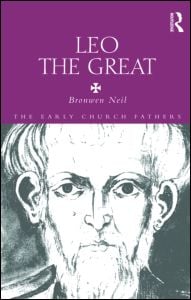In 2008 we had Bernard Green's The Soteriology of Leo the Great.
Then last year we had two other major works, including Bronwen Neil's book Leo the Great (London: Routledge, 2009), part of the on-going and quite excellent series on the Fathers that Routledge has been bringing out for more than a decade now. Neil, who teaches Latin at the

As I said in my review in Logos, this is a work of fascinating scholarship from which Eastern Christians can greatly benefit, not least because the more polemically minded among us have sometimes portrayed the development of the papacy as one continuous process of self-aggrandizement at the expense of the East. While Pope Leo I (440-461) did indeed continually press and expand his papal brief, it was only, one must underscore, in the West that he did so, and not because he was consumed by libido dominandi but simply because of “a deeper sense of justice that facilitated order and stability within the hierarchy” (127). Leo’s concerns about West-Roman authority had nothing to do with jealousy at Constantinople as some kind of parvenu. Rather, he was a quintessential Roman deeply concerned about the importance of the tranquilitas ordinis without which disorder and dissent would destroy the Body of Christ. In view of the ongoing sociopolitical chaos to which the West was subject in his century especially—with the sacking of Rome preceding his pontificate, and the collapse of the empire in the West coming after it—Leo’s view here is pastorally understandable.
The role Leo played at
Moreover, he resisted this canon because his decade-long campaign to strengthen papal “privileges” in the West led him to believe that what he had painstakingly accomplished on that score was exactly what
As the official international Orthodox-Catholic dialogue continues to discuss the papacy in the first millennium, they and all of us will find that there is much to learn or relearn about such popes as Leo (and later Gregory, also called Great, among others), whose exercise of papal authority is sharply at odds with the received notions in the West of a "universal" pope with real "universal" jurisdiction exercised over East and West alike. That notion of papal authority has done enormous damage to the entire Church, leading some in the West to imagine their own ultramontane fantasies have an actual basis in history when they do not, and leading some in the East precisely to fear such a kind of papacy as--in David Bentley Hart's memorable words--the "advance embassy of an omnivorous ecclesial empire." Clearly, then, both Catholics and Orthodox alike have much to reconsider as the study of the the papacy in the first millennium continues, and we can do so thanks in part to the illuminating scholarship of such as Susan Wessel.
No comments:
Post a Comment
Anonymous comments are never approved. Use your real name and say something intelligent.
Note: Only a member of this blog may post a comment.